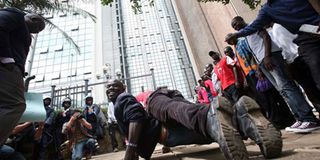Protesters are good and legal, as long as violence is avoided

Cord supporters demonstrate outside Anniversary Towers in Nairobi on May 9, 2016. They were protesting to have Independent Electoral and Boundaries Commission commissioners to resign. PHOTO | EVANS HABIL | NATION MEDIA GROUP
What you need to know:
- Article 20 prohibits expressions that are propaganda for war, and those advocating national, racial or religious hatred amounting to incitement to discrimination, hostility or violence.
- In many states, including Kenya, police see their main role as limiting protests, and asserting “law and order.”
- The police should then target the violent protesters, extract them from the protest and submit them to due process of the law.
Mass action is now the rage, with CORD leading weekly protests against the IEBC. This being Kenya, this has elicited a range of views, from vehement support through to deep resentment and desire to jail, or worse, all the protesters.
Now Jubilee is saying that they may organise their own counter-protests supporting the IEBC. This is good for the rights in our Constitution and international human rights law — which is part of our Constitution via Article 2 (6) — become alive when used.
Let’s be clear: Exercising one’s freedom of assembly does not demean or lower anyone’s status as Mr Peter Kenneth reportedly stated. Actually, under the Constitution, we are obliged to respect, protect and fulfil the rights described therein and we should be praising those who exercise them. It is as legal and constitutional a way of resolving problems as any.
Protests act as safety valves for burning issues, and they also let the state know the depth and breadth of opinion. There are few better or more effective ways for a state to gauge what the people want, outside of credible elections. But of course this only works if the state facilitates protests rather than reacting with a massive show of force that intimidates and scares.
We may hate the disruption that protests inevitably cause, but the alternative could be worse: either a permanent show of force that negates democratic values and instils silence and fear as in Uganda today, or chaos and violence when people meet the force of the state with their own force as in Burundi or Syria. Either way, the people, the economy, and the authorities are all worse off.
Freedom of assembly is about the process, not substance. The only condition is that it is peaceful, and is not restricted by Article 20 or the exceptions in Article 21 of the International Covenant on Civil and Political Rights, which is part of our Constitution via Article 2 (6). A boisterous, loud and untidy assembly is not a violent one.
RELIGIOUS HATRED
Article 20 prohibits expressions that are propaganda for war, and those advocating national, racial or religious hatred amounting to incitement to discrimination, hostility or violence.
The exercise of this right, like all fundamental rights, does not need the permission of authorities; that would turn it into a privilege to be dispensed by regimes at their discretion.
At most notification is advised, but only so that authorities can facilitate the assembly, rather than to give them the opportunity to interfere. Crucially, the primary role of the state is to facilitate the rights of protesters, and ensure their security, and that of bystanders, observers and the rest of the society.
But in many states, including Kenya, police see their main role as limiting protests, and asserting “law and order.” This is a convoluted approach that is not only contrary to international human rights standards, but it is also counterproductive, often inciting and agitating protesters into various forms of muscular reaction.
Some protesters can get violent. The police should then target the violent protesters, extract them from the protest and submit them to due process of the law. This enables the non-violent rest to continue exercising their individual right to assembly. Put another way, the presence of some violent protesters does not make the protest violent.
Dispersal using tear gas or water cannons (often laced with chemicals) must be a last resort for these indiscriminate weapons routinely affect uninterested bystanders, peaceful protesters and even the police. Note that while violent protesters lose the protection of the right to peaceful assembly, they always retain their other rights including their right to life, and right to bodily integrity.
Clearly all this requires a police force that is well trained in managing protests (which is different from crowd control that is used at tense football matches), and also that uses more brain than brawn.
The UN Human Rights Council recently adopted a report compiling practical recommendations on managing protests that should be mandatory reading for the police.
I look forward to Jubilee’s protests in support of the IEBC. And it will be interesting if our police will be the first in the world to treat pro-government protests the same way they treat dissenting protests.





